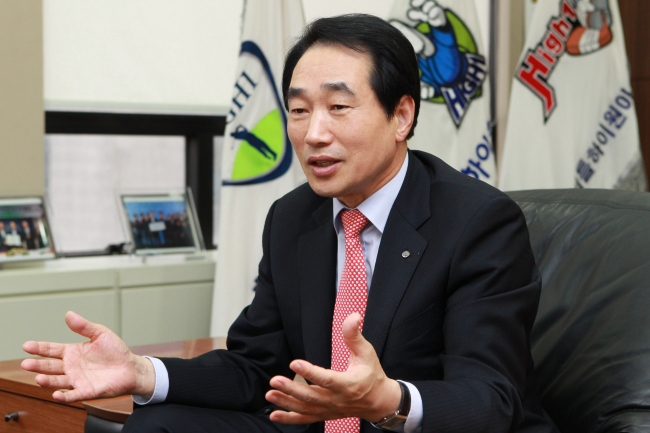Kangwon Land moving beyond casino to all-season, family resort
By Korea HeraldPublished : Sept. 22, 2013 - 20:26
Casinos had been off-limits to all Koreans until a legal gambling establishment opened 13 years ago in Gangwon Province.
Now the nation’s only casino open to Korean nationals is part of a sprawling resort complex.
Founded under a special law in 1998 in a valley home to abandoned mines, High1 Resort opened a casino two years later and then expanded its business domain by adding a golf course in 2005, ski slopes and condos in 2006, and a convention hotel in 2011.
Now the nation’s only casino open to Korean nationals is part of a sprawling resort complex.
Founded under a special law in 1998 in a valley home to abandoned mines, High1 Resort opened a casino two years later and then expanded its business domain by adding a golf course in 2005, ski slopes and condos in 2006, and a convention hotel in 2011.

“The desolate landscape of abandoned mines has been transformed into a lucrative and lively resort rich with recreational features,” Choi Hung-jib, chief executive of Kangwon Land Inc., which is the resort’s official corporate name, said in a recent interview with The Korea Herald.
Central and provincial governments benefited from the resort by receiving 3.9 trillion won ($3.6 billion) in tax revenues as of the end of 2012.
As the gamblers amassed, High1 had to expand the casino to provide a comfortable atmosphere. In June, its floor area increased by 86 percent, while 68 game tables and 400 machines were added. At the same time, it allotted more space exclusively for foreign gamblers.
Presently, one of its future growth engines is Water World, a water park to be completed in 2015.
“It’s like the finishing touch of our resort development. I am trying to break ground as early as possible,” Choi said. “It will be designed to fit into the surroundings of an elevated terrain.”
The convention hotel, among other facilities, is a milestone in its 15-year history of development.
The hotel has made it possible for Kangwon Land to compete in earnest in the events industry. The so-called MICE industry generates high profits by holding meetings, incentives, conferences and exhibitions. Incentives refer to incentive tourism, usually undertaken as an employee reward.
Since the convention hotel opened two years ago, it has hosted massive events. The Congress of the International Ski Federation in May 2012 brought 1,500 officials from 110 countries. In January, nearly 1,400 traders of Ahulian Ltd., a Thai multilevel marketing company, took part in incentive tourism. Korean actor and pop singer Jang Keun-suk attracted some 1,500 Japanese fans to his fan meeting in April.
“By most accounts, we have become a success in convention business. About 5 million people visit us every year,” Choi said.
“High1 Resort is now one of a few resorts in the world complete with ski slopes, a golf course, condos, a casino, hotels and a convention center, all set against well-preserved nature.”
In an effort to attract visitors, it signed a deal with China Travel Service Inc. early this year to develop and market vacation programs jointly.
It is hard for a business to survive without win-win relations with its community. High1 Switch Back Resort, scheduled to open next year if completed, will likely boost activity in regional tourism. The resort will offer amusement rides on the same railroad that was used by miners.
To return profits to society is as important as making money. This year, 25 billion won was set aside for social contributions. It is up 2 billion won from last year.
“We have fixed the minimum of our budget for social contributions at 5 percent of our earnings,” he said. “It is the third-highest ratio among the top 50 listed companies.”
Kangwon Land offers a scholarship to students in abandoned mine areas and also spends 2 billion won each year to treat pneumoconiosis patients and support their livelihood.
“We aim at doubling the annual number of visitors to 10 million by 2020. To attain the goal, we should be the ultimate family vacation resort with all-season, all-inclusive recreational facilities,” Choi said. “We are not far from the vision.”
By Chun Sung-woo (swchun@heraldcorp.com)
-
Articles by Korea Herald












![[Today’s K-pop] BTS pop-up event to come to Seoul](http://res.heraldm.com/phpwas/restmb_idxmake.php?idx=644&simg=/content/image/2024/04/17/20240417050734_0.jpg&u=)





![[KH Explains] Hyundai's full hybrid edge to pay off amid slow transition to pure EVs](http://res.heraldm.com/phpwas/restmb_idxmake.php?idx=652&simg=/content/image/2024/04/18/20240418050645_0.jpg&u=20240418181020)

![[Today’s K-pop] Zico drops snippet of collaboration with Jennie](http://res.heraldm.com/phpwas/restmb_idxmake.php?idx=642&simg=/content/image/2024/04/18/20240418050702_0.jpg&u=)